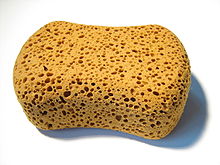sponge
English




Etymology
From Old English spunge, taken from Latin spongia, from Ancient Greek σπογγιά (spongiá), related to σπόγγος (spóngos).
Pronunciation
Noun
sponge (countable and uncountable, plural sponges)
- (countable) Any of various marine invertebrates, mostly of the phylum Porifera, that have a porous skeleton often of silica.
- Synonyms: sea sponge, bath sponge, poriferan, porifer
- (countable) A piece of porous material used for washing (originally made from the invertebrates, now often made of plastic).
- Synonym: bath sponge
- 1913, Robert Barr, chapter 5, in Lord Stranleigh Abroad[1]:
- She removed Stranleigh’s coat with a dexterity that aroused his imagination. The elder woman returned with dressings and a sponge, which she placed on a chair.
- (uncountable) A porous material such as sponges consist of.
- (informal) A heavy drinker.
- Synonyms: souse, swill-pot; see also Thesaurus:drunkard
- (countable, uncountable) A type of light cake.
- Synonym: sponge cake
- (countable, uncountable, British) A type of steamed pudding.
- Synonym: sponge pudding
- (slang) A person who takes advantage of the generosity of others (abstractly imagined to absorb or soak up the money or efforts of others like a sponge).
- Synonyms: freeloader, sponger; see also Thesaurus:scrounger
- (countable) A form of contraception that is inserted vaginally; a contraceptive sponge.
- Any sponge-like substance.
- A mop for cleaning the bore of a cannon after a discharge. It consists of a cylinder of wood, covered with sheepskin with the wool on, or cloth with a heavy looped nap, and having a handle, or staff.
- The extremity, or point, of a horseshoe, corresponding to the heel.
Derived terms
Derived terms
Descendants
- → Hindi: स्पंज (spañj)
- → Japanese: スポンジ (suponji)
- → Korean: 스펀지 (seupeonji)
- → Pashto: سپنج (spanj)
- → Welsh: spynj
Translations
marine invertebrate
|
piece of porous material used for washing
|
porous material
|
informal: heavy drinker
sponge cake — see sponge cake
sponge pudding — see sponge pudding
slang: person who takes advantage of the generosity of others
|
form of contraception
|
any spongelike substance
mop for cleaning the bore of a cannon
|
point of a horseshoe
|
See also
Verb
Lua error in Module:en-headword at line 1107: Legacy parameter 1=STEM no longer supported, just use 'en-verb' without params
- (intransitive, slang) To take advantage of the kindness of others.
- (Can we date this quote by L'Estrange and provide title, author’s full name, and other details?)
- The fly is an intruder, and a common smell-feast, that sponges upon other people's trenchers.
- He has been sponging off his friends for a month now.
- (Can we date this quote by L'Estrange and provide title, author’s full name, and other details?)
- (transitive, intransitive with on or upon) To get by imposition; to scrounge.
- Synonym: blag
- 1918, W. B. Maxwell, chapter 13, in The Mirror and the Lamp:
- “[…] They talk of you as if you were Croesus—and I expect the beggars sponge on you unconscionably.” And Vickers launched forth into a tirade very different from his platform utterances. He spoke with extreme contempt of the dense stupidity exhibited on all occasions by the working classes.
- (Can we find and add a quotation of Jonathan Swift to this entry?)
- to sponge a breakfast
- (transitive) To deprive (somebody) of something by imposition.
- (Can we date this quote by South and provide title, author’s full name, and other details?)
- How came such multitudes of our nation […] to be sponged of their plate and their money?
- (Can we date this quote by South and provide title, author’s full name, and other details?)
- To clean, soak up, or dab with a sponge.
- To suck in, or imbibe, like a sponge.
- To wipe out with a sponge, as letters or writing; to efface; to destroy all trace of.
- (Can we find and add a quotation of Hooker to this entry?)
- (intransitive, baking) To be converted, as dough, into a light, spongy mass by the agency of yeast or leaven.
Translations
to take advantage of others
|
to clean with a sponge
Further reading
Anagrams
Categories:
- English terms inherited from Old English
- English terms derived from Old English
- English terms derived from Latin
- English terms derived from Ancient Greek
- English 1-syllable words
- English terms with IPA pronunciation
- English terms with audio pronunciation
- Rhymes:English/ʌndʒ
- English lemmas
- English nouns
- English uncountable nouns
- English countable nouns
- English terms with quotations
- English informal terms
- British English
- English slang
- en:Baking
- English intransitive verbs
- Requests for date/L'Estrange
- English terms with usage examples
- English transitive verbs
- Requests for quotations/Jonathan Swift
- Requests for date/South
- Requests for quotations/Hooker
- en:Birth control
- en:Hygiene
- en:Metallurgy
- en:People
- en:Sponges